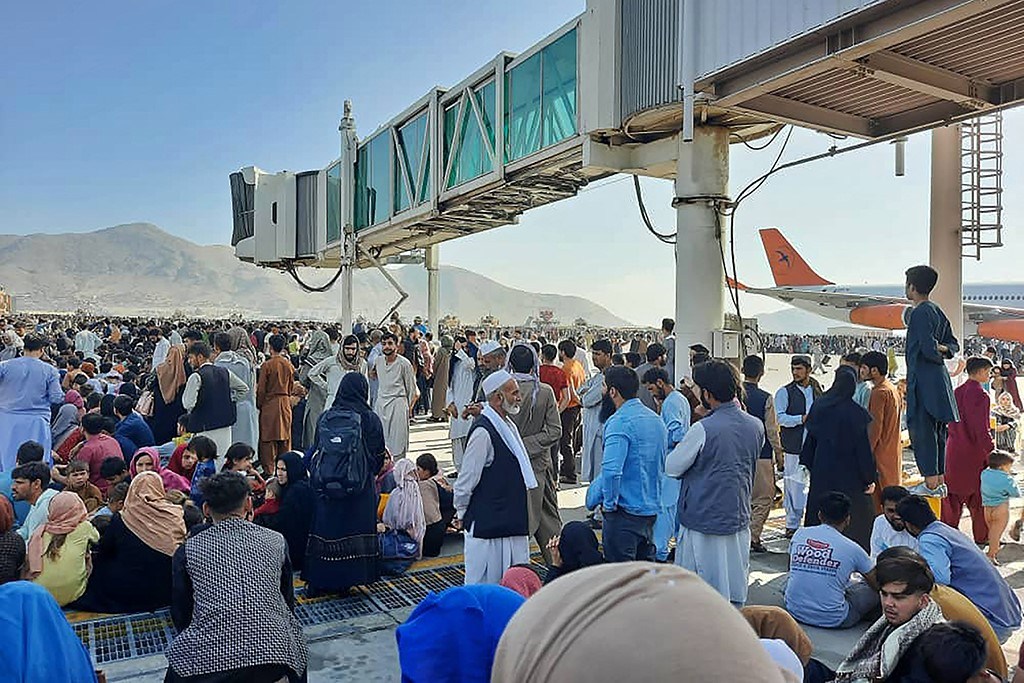After the Taliban overran most of Afghanistan last week and captured major cities, its forces took over the capital Kabul during the weekend and were shown inside the residence of president Ashraf Ghani who had already fled country.
In a message on Facebook, President Ghani wrote that he had left the country to avoid any bloodshed in the capital. The Afghan national army, trained and armed by the US since its invasion of Afghanistan 20 years ago following the 9/11 terrorist attacks, did hardly put up any resistance after the withdrawal of American troops since May this year.
The sudden fall of Kabul took the American administration by surprise despite its intelligence services on the ground. Only recently, President Biden expressed his belief in the Afghan army and its resolve to defend the capital. But it turns out that its strength was exaggerated because of widespread corruption and commanders pocketing salaries for soldiers that did not exist.
Biden has changed and rectified most of his predecessor Trump’s decisions on domestic and foreign affairs but when it came to Afghanistan, he pursued the same policy and stuck to Trump’s peace agreement with the Taliban despite the changing circumstances on the ground.
The 2020 Doha Agreement between the US and Taliban called for the withdrawal of American troops from Afghanistan as of May this year. The agreement stated that the Taliban and the Afghan government would conduct their own negotiations on a peaceful transfer of power after elections.
But this never happened. The two sides could not agree on the release of prisoners as a condition of starting serious talks and never negotiated in good faith. Instead of maintaining a cease-fire during the talks, the Taliban launched a military offensive during which hundreds of civilians were killed.
Already on Sunday (15 August), the US announced that its embassy staff would be evacuated and the state department recommended other foreign embassies to do the same. The world is bracing for what will happen now in Afghanistan.
EU position
In a statement last week (12 August), EU foreign policy chief Josep Borrel said that “the Taliban’s ongoing military offensive is in direct contradiction to their stated commitment to a negotiated settlement of the conflict and the Doha peace process” but did not call on the US to keep forces in the country to prevent a Taliban power-grab.
However, he warned that “if power is taken by force and an Islamic Emirate re-established, the Taliban would face non-recognition, isolation, lack of international support, and the prospect of continued conflict and protracted instability in Afghanistan.”
In a joint statement on Monday morning, the EU together with a number of Member States and non-EU nations called on all parties "to respect and facilitate, the safe and orderly departure of foreign nationals and Afghans who wish to leave the country".
“Afghans and international citizens who wish to depart must be allowed to do so; roads, airports, and border crossing must remain open, and calm must be maintained. The Afghan people deserve to live in safety, security, and dignity. We in the international community stand ready to assist them.”
There is no common EU policy on the treatment of asylum applications by Afghan nationals with individual Member State deciding their own policy. The Belgian State Secretary for Asylum and Migration Sammy Mahdi has reversed his previous position on sending Afghan asylum seekers back to Afghanistan.
“As the situation in the airport has become chaotic in Kabul, it is impossible to send those people back at the moment since most repatriations go through Kabul airport,” his spokesperson told The Brussels Times. The situation in Afghanistan has now become so terrible that “it is clear that Afghan refugees cannot be sent back to their country at this moment.”
Another issue is the rescue of Afghans who worked as translators and collaborated with the US and other countries, who joined the coalition, or worked with international aid organisations. They fear for their lives if they stay in Afghanistan. The US has put in place procedures for allowing them to move to the US but it is full of bureaucratic hurdles and it takes years to complete the process.
EU Member States who employed local translators and other support staff were also taken by surprise and have now to change their own rules to enable them to seek asylum and protection.
The Swedish foreign minister Ann Linde said at a press conference yesterday that Sweden plans to facilitate the reception of up to 300 local people, including families, who supported its troops, by cancelling the condition that asylum applications must be filed outside Afghanistan. It is closing its embassy in Kabul but it will continue to work in Stockholm, according to the foreign minister.
Asked if the whole effort to carry out democratic reforms in Afghanistan was a failure, she replied that the reforms were not in vain and had benefited Afghan women. She thought that it would be possible to collaborate with the Taliban regime and continue development projects in the country.
The Taliban has already announced that it plans to establish the Islamic Emirate of Afghanistan. This could mean a reversal to the situation in the past when they ruled by strict Sharia law. Should this happen, the American invasion and withdrawal, supported by the EU and its Member States, will be remembered as another foreign policy disaster and a lesson in the impossibility to impose democracy on a country.
M. Apelblat
The Brussels Times

